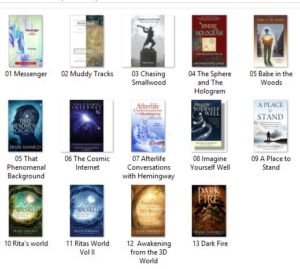Toward the end of a year, I like to look back, to try to remember what I was reading and writing and thinking about, and the way to do that is to look through my journals, because it’s amazing how much of your life goes up in smoke if you don’t write it down.
Got a bit of a shock this year, though. I went rooting through the bookshelf, working backward to the journal book from last January, and realized that the year 2018 had filled eight volumes of 6 x 9 college-ruled spiral bound books of 150 sheets. That is, 1200 – count ’em, I said twelve hundred – sheets of paper, or 2400 pages.
I said, “Impossible,” but then I did the pretty elementary math, and realized that 200 pages a month is less than seven pages a day. On days when I’m talking to the guys, I usually fill at least eight pages, and apparently in 2018 I talked to them pretty regularly.
“Many a little makes a much,” the old saying has it. But still, that’s an impressive number of words. Makes me realize that I do more work than I usually think I do.
